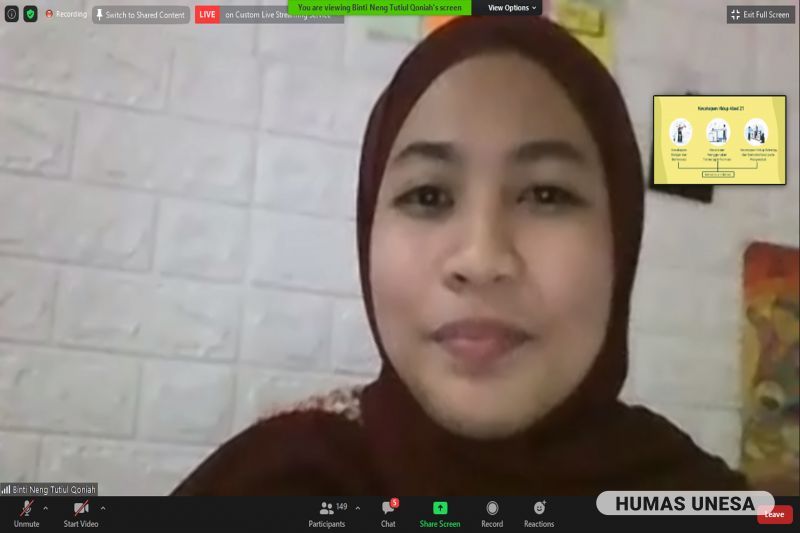
www.unesa.ac.id
Unesa.ac.id, Surabaya-The Department of Biology, Faculty of Mathematics and Natural Sciences, State University of Surabaya held an Education Webinar today, May 28, 2021. This webinar was held using the Zoom platform and live Youtube starting at 07.30 WIB presenting three speakers, namely Dr. Sifak Indana, M.Pd., Djoko Prakoso, S.Pd., and, Binti Neng Tutiul Qoni'ah.
Djoko Prakoso, S.Pd from the Surabaya IPA MGMP Team and as a teacher at SMP 13 Surabaya in his delivery said that schools, teachers, students and parents must work together and contribute to each other. "Students are required to literate before learning and work on AKM questions," he said. "If the results are not good, from the results of trials or practice questions on students, the results are still lacking, it is necessary to conduct an evaluation of teaching and learning methods," said Djoko.
Meanwhile, Dr. Sifak Indana, M.Pd., Deputy Dean III of FMIPA and Lecturer at the Department of Biology, Unesa, explained that students' literacy skills are still low, lack critical thinking and are weak in solving problems, and are difficult in processing information.
In addition, it is also difficult to face new problems or problems. Assessments that are standardized are generally still low and only provide assessments, not feedback to students. "In line with the Ministry of Education and Culture regulations, this AKM appears, AKM will measure basic skills, namely literacy and numeracy," he explained. "By assessing the minimum competency in literacy and numeracy, we are preparing the nation's future students who are able to face the 21st century," added Binti.
Then, Binti Neng Tutiul Qoni'ah said, life skills in the 21st century are skills in terms of learning and innovating, using technology, and being able to live at work and contribute to society. The benefits of AKM are a portrait of the quality of learning, feedback on improving the quality of learning, and the basis for program development.
In line with the competence in the Minimum Competency Assessment. "There are two competencies of AKM, namely reading literacy, which includes aspects of understanding, using, evaluating, and reflecting. And in mathematical literacy (numeracy) there are concepts, procedures, facts, and mathematical tools, "said Binti. (Madina)
Share It On:






